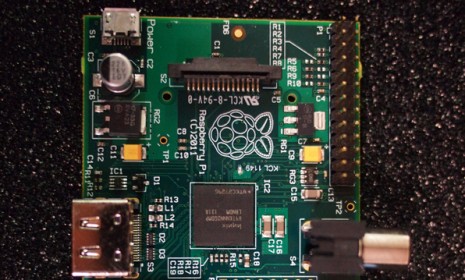The world's simplest computer: Why it sparked a 'buying frenzy'
Tech fans are hungry for Raspberry Pi, a bare-bones computer the size of a credit card that costs just $35 a pop

A free daily email with the biggest news stories of the day – and the best features from TheWeek.com
You are now subscribed
Your newsletter sign-up was successful
Forget the iPad3: The newest tech sensation is the Raspberry Pi, a computer the size of a credit card that has no screen, no casing, and no keyboard. With its circuits exposed, the $35 Raspberry Pi "looks rather odd next to the sleek modern offerings" we've grown accustomed to, says Sean Poulter at Britain's Daily Mail. Yet the bite-sized computer, which debuted earlier this week, sold out on its first day. Thanks to the "buying frenzy," says Charlie Osborne at ZDNet, websites selling the device crashed. Here's what you should know:
What exactly is the Raspberry Pi?
A small motherboard with various ports for plugging in keyboards, monitors, and internet cables. It runs a Linux-based operating system, and is powered by a standard mobile charger. It has no built-in software or applications.
The Week
Escape your echo chamber. Get the facts behind the news, plus analysis from multiple perspectives.

Sign up for The Week's Free Newsletters
From our morning news briefing to a weekly Good News Newsletter, get the best of The Week delivered directly to your inbox.
From our morning news briefing to a weekly Good News Newsletter, get the best of The Week delivered directly to your inbox.
What does it do?
The Raspberry Pi was initially designed to teach children how to write programs and create software — and there's little else you can do with it. Plug in your keyboard and screen, and you're presented with what is essentially a blank slate on which to write your own programs.
How am I supposed to learn how to program?
Tech sites are already featuring do-it-yourself projects involving the Raspberry Pi, and there are video tutorials to get neophytes started.
A free daily email with the biggest news stories of the day – and the best features from TheWeek.com
But why do I need to program?
While younger generations are considered "more tech-savvy than their elders," most people of any age still don't know how "software actually works," says Osborne. The result is that tech companies find it increasingly difficult to find qualified workers and university applicants in the field of computing are surprisingly clueless when it comes to the fundamentals. The Raspberry Pi could help change that.
Sources: The Atlantic Wire, CNN, The Daily Mail, Gizmodo, The Guardian, ZDNet
-
 How the FCC’s ‘equal time’ rule works
How the FCC’s ‘equal time’ rule worksIn the Spotlight The law is at the heart of the Colbert-CBS conflict
-
 What is the endgame in the DHS shutdown?
What is the endgame in the DHS shutdown?Today’s Big Question Democrats want to rein in ICE’s immigration crackdown
-
 ‘Poor time management isn’t just an inconvenience’
‘Poor time management isn’t just an inconvenience’Instant Opinion Opinion, comment and editorials of the day